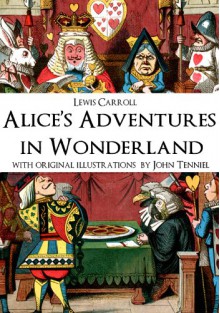About this Edition:Doma House Publishing presents to you this version of Alice’s Adventures in Wonderland, which has been designed and formatted specifically for your Amazon Kindle. Unlike other e-book editions, the text and chapters are perfectly set up to match the layout and feel of a physical...
show more
About this Edition:Doma House Publishing presents to you this version of Alice’s Adventures in Wonderland, which has been designed and formatted specifically for your Amazon Kindle. Unlike other e-book editions, the text and chapters are perfectly set up to match the layout and feel of a physical copy, rather then being haphazardly thrown together for a quick release. This edition also includes the brilliant visual illustrations by Sir John Tenniel, which are commonly left out of other Kindle productions, and a brief biography on the life of Lewis Carroll. Also, you can easily navigate through chapters using the linked Table of Contents found at the start of this edition. Thank you for choosing Doma House Publishing. We look forward to creating many more affordable Kindle Classics for you to enjoy.About the story:Source of legend and lyric, reference and conjecture, Alice's Adventures in Wonderland is for most children pure pleasure in prose. While adults try to decipher Lewis Carroll's putative use of complex mathematical codes in the text, or debate his alleged use of opium, young readers simply dive with Alice through the rabbit hole, pursuing "The dream-child moving through a land / Of wonders wild and new." There they encounter the White Rabbit, the Queen of Hearts, the Mock Turtle, and the Mad Hatter, among a multitude of other characters--extinct, fantastical, and commonplace creatures. Alice journeys through this Wonderland, trying to fathom the meaning of her strange experiences. But they turn out to be "curiouser and curiouser," seemingly without moral or sense.For more than 130 years, children have reveled in the delightfully non-moralistic, non-educational virtues of this classic. In fact, at every turn, Alice's new companions scoff at her traditional education. The Mock Turtle, for example, remarks that he took the "regular course" in school: Reeling, Writhing, and branches of Arithmetic-Ambition, Distraction, Uglification, and Derision. Carroll believed John Tenniel's illustrations were as important as his text. Naturally, Carroll's instincts were good; the masterful drawings are inextricably tied to the well-loved story. (All ages) --Emilie Coulter
show less






 9 years ago
9 years ago